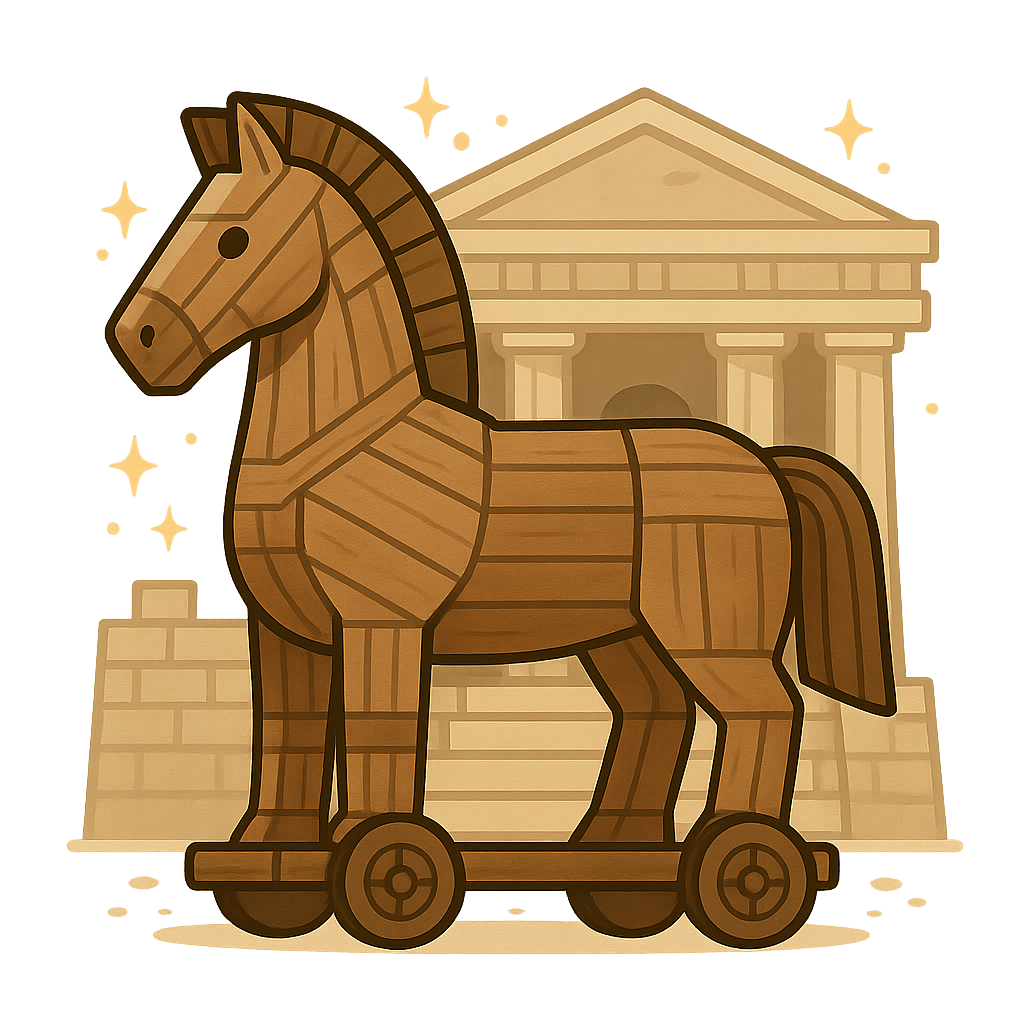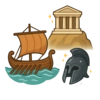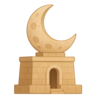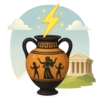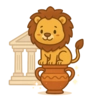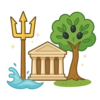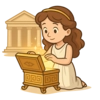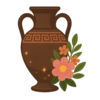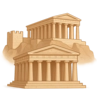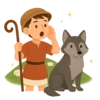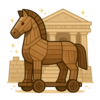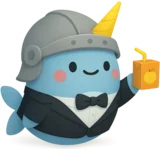The Trojan Horse
My name is Odysseus, and for ten long years, the dust of the Trojan plain has been my home. I am a king from the island of Ithaca, but here, before the mighty walls of Troy, I am just one of thousands of Greek soldiers, weary from a war that feels endless. Every day, we look upon those impenetrable stone walls, a constant reminder of our failure to reclaim Helen, the queen of Sparta, and end this conflict. The greatest warriors, men like Achilles and Ajax, had fought and fallen, yet the city stood defiant. Our most powerful armies, our most brilliant strategists, have all been stopped by stone and bronze. We had tried everything—direct assaults, long sieges, individual combat—but nothing worked. It became painfully clear that brute force was not the answer. We needed something more than strength; we needed an idea so audacious, so unexpected, it would bypass their defenses entirely. This is the story of how a desperate thought, born from frustration and cunning, became the legend of the Trojan Horse.
The idea came to me not in a clash of swords, but in the quiet of the night, as I stared at the unblinking stars. What if we couldn't break down the gates? What if, instead, we could convince the Trojans to open them for us? I gathered the other Greek leaders—Agamemnon, Menelaus, and the rest—in my tent and proposed a plan that sounded like madness. 'We will build a colossal wooden horse,' I announced, 'a supposed offering to the goddess Athena to ensure our safe journey home.' I could see the skepticism in their eyes. But I continued, explaining that its hollow belly would be our true weapon, a hiding place for our best soldiers. We would then make a grand show of sailing away, leaving this magnificent 'gift' on the beach as a sign of our surrender. The plan was outrageously risky. It relied entirely on deception, on our understanding of our enemy's pride and their deep reverence for the gods. We knew they would see the horse as a trophy, a monument to their victory over the Greeks. To make it believable, the horse had to be a masterpiece. We found a master craftsman, Epeius, who, with the divine guidance of Athena herself, began to shape the giant beast from fir planks. For days, the sounds of saws and hammers filled our camp, not with the noise of war, but of creation. Slowly, it took shape, its wooden eyes staring blankly toward the city we aimed to conquer. It was an object of both beauty and terror, a perfect vessel for our desperate gamble.
The day came when the horse was complete. It towered over our camp, a silent, wooden monster casting a long shadow in the morning sun. I, along with my most trusted men, climbed a rope ladder and descended into the suffocating darkness of its hollow core. It was cramped, hot, and smelled of pine resin and nervous sweat. We were packed shoulder to shoulder, our swords and shields clanking softly with every movement. Through small, hidden peepholes, we watched our own army burn their camps, creating a scene of utter abandonment, and then sail their ships toward the horizon until they were just specks on the sea. The silence they left behind was deafening, broken only by our own shallow breaths. Soon, we heard the curious shouts of the Trojans as they ventured from their gates and discovered the horse. A great debate erupted. Some, like the priest Laocoön, were suspicious. 'I fear the Greeks, even when they bear gifts!' he cried, hurling his spear into the horse's flank. The sound echoed like thunder inside our wooden prison, and we froze, certain we were discovered. But others saw the horse as a divine trophy, a symbol of their hard-won victory. Their pride, as I had predicted, won out over their caution. With heavy ropes and wooden rollers, they began the laborious task of pulling their own doom into the very heart of their impenetrable city.
Inside the horse, every jolt and cheer from the Trojan streets was magnified. We heard them celebrating, their voices muffled by the wooden walls of our prison. They sang songs of their triumph, their laughter echoing as they feasted and drank, completely unaware of the danger lurking in their midst. The wait was agonizing. For hours, we had to remain perfectly still, our muscles cramping, our throats dry, our breath held tight. Any sound, any cough or scrape of armor, would mean our immediate demise. It was a test of discipline unlike any battle we had ever fought. Finally, night fell, and the sounds of revelry slowly faded into the quiet hum of a sleeping city. This was the moment we had gambled everything for. A trusted spy we had left behind, Sinon, who had masterfully convinced the Trojans to accept the gift, gave the signal—a single, shining light from a distant torch. Carefully, silently, we unlatched the hidden trapdoor in the horse's belly and lowered a rope. One by one, we slipped out into the moonlit streets of Troy, silent shadows moving with deadly purpose toward the city gates.
We unbarred the massive gates from the inside, and our army, which had only pretended to sail away and had returned under the cover of darkness, flooded into the unsuspecting city. The war that had lasted a grueling decade was over in a single night. The story of our trick has been told for thousands of years, first by poets like Homer, who chronicled my long journey home in his epic, the Odyssey, and later by the Roman poet Virgil in the Aeneid. It became a timeless lesson about cleverness, deception, and the danger of underestimating an opponent. Today, the phrase 'Trojan Horse' is used to describe a hidden danger disguised as something harmless, like a computer virus hidden in a friendly-looking email. It shows how this ancient myth still teaches us to think critically and look beyond appearances. The wooden horse was more than just a trick; it was a story about how human ingenuity can overcome even the mightiest walls, a tale that continues to spark our imagination and make us wonder about the fine line between cleverness and deceit.
Activities
Take a Quiz
Test what you learned with a fun quiz!
Get creative with colors!
Print a coloring book page of this topic.

